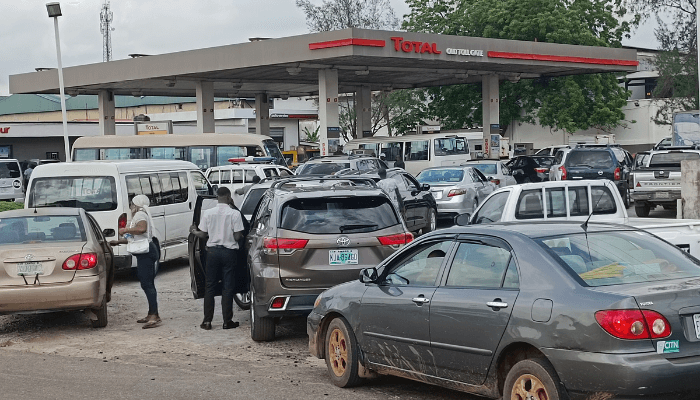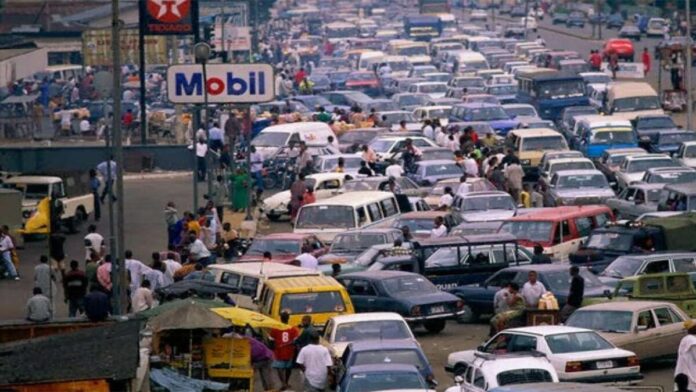Nigerians are on the dividing line over deteriorating fuel scarcity in Nigeria and other economic glooms as the year 2022 slowly comes to an end.

In just a few days to the end of 2022, there have been waves of fuel scarcity headaches for many Nigerians. As people contend with other problems, it does not look like it will end soon. Continuous fuel scarcity, rising inflation, poverty, and electricity crisis are critical problems hunting the country.
Nigerians are not new to fuel scarcity, as it has nearly become normal. At least once yearly, they withstand long lines at petrol stations or purchase at greater prices on the black markets. And the most probable time this experience comes around is December. People use a substantial part of their holiday jostling for fuel at petrol stations.
However, this year is unlike it. Nigeria is in the course of its third surge of national fuel scarcity in a year. And that leaves out the bags of scarcity suffered in some places at different times. Abuja has been battling fuel scarcity since October because of the hiccups along the source-string path.
Waves of Fuel Scarcity in Nigeria
The first wave occurred in February when the NNPC, the only importer of petrol in Nigeria. Imported tainted petrol. The second wave happened in June when petrol carriers stopped moving petrol to some places in the country because of the price of diesel.
The latest one is going on because acquiring vessels to move fuel has been been a big task. But all these surges of fuel scarcity result from larger problems the country has failed to find a solution to.
SEE: Current Price of Petrol in Nigeria
Subsidy
Now more than ever, Nigeria’s fuel scarcity indicates how its policies are mostly trapped between a pillar and a difficult place. Fuel subsidy has been a significant factor in all three surges.
It is a complication that is inevitable for policymakers in Nigeria. Subsidies are apparently not good for the economy, but the substitute is most likely a misfortune to the economy as it will worsen the already bad situation.
European countries purify most of Nigeria’s fuel since our refineries are far from operating. And subsidies make it non-profitable for private companies to ship fuel to Nigeria. So, since 2017, the NNPC has been the sole entity taking up that burden. This explains how Nigeria has mitigated its people from abrupt hikes in power prices.
The first setback with this policy is that Nigeria does not have enough money. This year, Nigeria’s predicted expenditure on fuel subsidy is $15.7 billion. That is much more than all the states spent in 2021 ($9.8 billion).
So a major part of the country’s debt crisis originates from this spending. More so, it opens doors for stealing and corruption, and in the end, benefits the rich ahead of the poor. The rich are mostly not affected as the poor.
But on the other hand, this fuel scarcity is evidence of how removing subsidies might be a ticking time bomb. Nigerians are presently too open to cost shocks, contending with significant inflation and poverty of different phases.
And because the supply of electricity in Nigeria is unstable. Citizens need fuel as an optional energy source to supply electricity to their homes and operate their businesses.
What is causing scarcity?
Yes, it is exactly as you saw. Fuel scarcity in Nigeria is a result of another scarcity. This has more than one interpretation, but we will begin with the easiest one. When marketers wait for scarcity, their reply is mostly to fashion it. So, they keep everything they have in reserve until they are sure if what they are worried about is right.
One of the lasting worries is the impending removal of subsidies. The reality that Nigeria is looking to stop paying for subsidies next year holds a number of doubts and may lead to hollow scarcity all over the markets.
Another somewhat more difficult meaning is that everybody in the country contributes to the scarcity of diesel. The vessels that move fuel from the ships to marine depots operate on diesel. The depots continuously depend on diesel to generate power.
Tankers that move fuel from depots to fuel stations use diesel to operate. The absence of diesel means that petrol will not be available. So, when the price of diesel changes from N288/liter in January to N790/liter in September (all because of Russia and Ukraine) and prices of fuel hardly alter, it will most likely develop into a problem.
Somebody has to be responsible for all the diesel. And now, the market is using the scarcity of petrol to ensure they recoup their money. If the government does not increase the petrol price (that is what they want), there will be continuous sales at high prices to the people.
SEE: Price of Cement in Nigeria in 2022
Incessant Fuel Scarcity in Nigeria
In many cities, fuel lines have reemerged as motorists and customers growl over the scarcity of products and the hike in the cost of transportation. Although big filling stations in some places still sell fuel at the price of 179-180/Per liter, citizens continue to bemoan the dissatisfaction with getting fuel in their area.
Areas like Lagos, Akwa Ibom, Cross River, Nasarawa, Niger States, and others face the same ordeal. A condition professionals in the field attributed to fuel subsidies and shortage of fuel supply.
Reacting to the fuel scarcity, Billy Gillis-Harry, who is the President of Petroleum Products Retail Outlets Owners Association of Nigeria, PETROAN, in an interview with Arise TV, said it is because of the shortage of supply. He said, “Truth is that our source of supply is faced with pressure; the source of supply is not making enough products to match the utilization demand”.
As a way out, Mr. Babajide Soyode, a previous general manager at the Nigerian National Petroleum Corporation, Limited, revealed that the removal of subsidy would end fuel scarcity in Nigeria.
SEE: What is the Meaning of Zazu?
FAQs for Fuel Scarcity in Nigeria
Nigeria’s current gas shortage — the third in 2022 — is because gas retailers are struggling with rising costs, Isong said.
Nigeria Imports from Russia of Petroleum Oils, Oils Obtained from Bituminous Minerals – data, historical chart, and statistics
In 2020, the top partner countries from which Nigeria Imports Fuels include the Netherlands, Belgium, India, Norway, and the United Arab Emirates.
As of September 2022, the average price of gasoline in Nigeria was 191.65 Nigerian naira (NGN) per liter, around 0.44 U.S. dollars.
As of the fourth quarter of 2021, India and Spain were the main importers of crude oil from Nigeria.
Nigeria’s Exports of crude oil to China were US$595.17 Million in 2021, according to the United Nations COMTRADE database on international trade.
Despite continuous talks by the Federal Government on the breakthrough made to halt fuel scarcity, the situation has continued to linger. Amid all these difficulties, the impending 2023 general elections are a sign of hope for many Nigerians.





